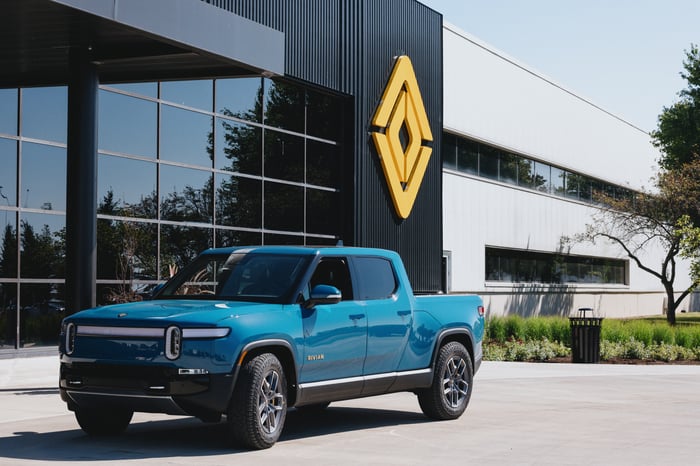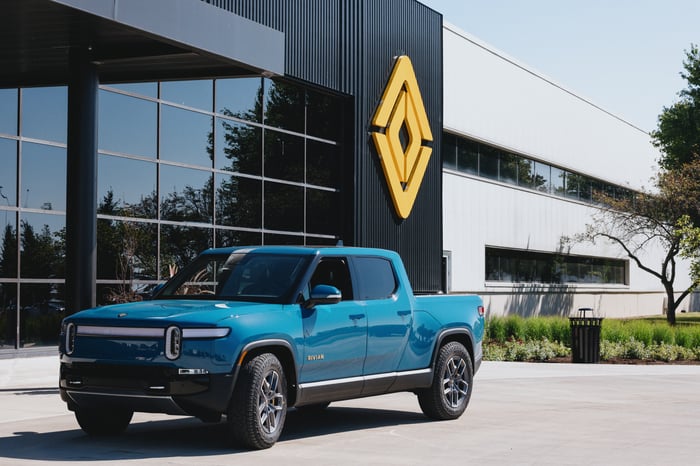Rivian Automotive’s Market Journey: From Hype to Reality (NASDAQ: RIVN)
The electric vehicle (EV) manufacturer Rivian Automotive drew considerable attention with its initial public offering (IPO) on November 9, 2021. The stock debuted at $78 per share, opening at $106.75 and soaring to a remarkable high of $172.01 within just a week.
At that peak, Rivian’s market capitalization reached $153 billion, a staggering 92 times its anticipated revenue for 2022. This valuation momentarily positioned the young EV company as more valuable than both Ford and General Motors.

Image source: Rivian.
Rivian’s stock surge was fueled by three key factors: backing from influential companies like Amazon and Ford, the ability to produce thousands of EVs, and the excitement surrounding the meme stock phenomenon at that time. However, Rivian now sees its shares trading around $10, reducing its market cap to a modest $10 billion. This amounts to less than twice the revenue the company anticipates generating next year.
The optimism faded as Rivian’s growth stalled, losses mounted, and rising interest rates deflated its previous valuations. Ford’s decision to withdraw from its collaboration with Rivian in 2021 and sell the majority of its shares added to the disappointment. This leads investors to wonder: could purchasing Rivian stock now, while it is undervalued, yield significant returns in the future?
What Went Wrong for Rivian Investors?
Currently, Rivian manufactures three vehicle models: the R1T pickup, the R1S SUV, and a specialized delivery van for Amazon. Before its stock market entry, Rivian projected it would produce 50,000 vehicles by the end of 2022. The reality was much different – the company produced only 24,337 vehicles and delivered just 20,332. Rivian attributed these shortfalls to supply chain issues and a cooldown in the EV market.
In 2023, Rivian rebounded, producing 57,232 EVs and delivering 50,122 units. This uptick was aided by resolving supply chain challenges and increasing production of its Enduro drive unit, which helped lower costs.
However, for 2024, Rivian anticipates producing only 47,000 to 49,000 vehicles. Supply chain issues persisted, worsened by the temporary closure of its Illinois plant in April for upgrades. Increased competition in the EV market and high-interest rates compounded these challenges. Rivian projects full-year deliveries between 50,500 and 52,000 vehicles.
Can Rivian Achieve Growth?
In 2023, Rivian’s revenue surged by 167%, reaching $4.43 billion. Nonetheless, its net loss only slightly improved from $6.75 billion to $5.43 billion. For 2024, analysts forecast a modest revenue increase of 6% to $4.71 billion while narrowing its net loss to $4.88 billion. Despite these losses, Rivian reported $9.18 billion in liquidity, including $7.87 billion in cash and short-term investments at the end of June.
This past June, Volkswagen announced a joint venture with Rivian to co-develop new electric vehicle architecture and software. This partnership includes a planned investment of up to $5 billion over the next two years, providing Rivian with crucial funding to develop its entry-level R2 SUV set to launch in 2026 and to continue fulfilling Amazon’s extensive order of 100,000 electric delivery vans by 2030. Rivian also intends to start marketing delivery vans to other clients in the coming years.
To support its growth ambitions, Rivian applied for a federal loan to resume work on a new $5 billion plant in Georgia, poised to triple its annual production capacity. This development outlines a hopeful path, although significant challenges remain with supply chain constraints and the need to solidify its operational scale.
Concerns linger as Rivian insiders have sold almost 86 times more shares than they have purchased in the last three months, indicating a potential struggle to stabilize its business that would reward investors with a higher valuation. A ray of hope remains, however, as Amazon continues to hold its investment in Rivian, affirming its status as the company’s leading investor.
Is Rivian’s Stock a Future Goldmine?
With a low price-to-sales ratio, Rivian stands out as an attractive option for investors seeking turnaround opportunities. Should it manage to expand like Tesla over the last decade, Rivian could become a significant asset. Nonetheless, Tesla benefited from starting early, receiving generous government support, and facing little competition during its rise. It is premature to predict that Rivian can replicate Tesla’s expansion success.
Nevertheless, given the current stock price of Rivian, the downside risk for new investors is potentially limited, making it a viable option for those willing to take aggressive positions for long-term gains. Rivian holds promise for turning a small investment into a substantial asset, but investors should be wary, as the stock price could halve or worse if production does not escalate meaningfully.
Don’t Let This Opportunity Slip Away
Have you ever felt you missed out on investing in successful stocks? If so, read closely.
Rarely, our analysts signal a “Double Down” stock recommendation for companies poised for growth. If you think you’ve passed your chance to invest, now may be the right moment before it gets too late. The data backs this up:
- Amazon: If you had invested $1,000 when we doubled down in 2010, you’d have $21,285!*
- Apple: Investing $1,000 when we doubled down in 2008 would have yielded $44,456!*
- Netflix: An investment of $1,000 when we doubled down in 2004 would have grown to $411,959!*
Currently, we are issuing “Double Down” alerts for three remarkable companies, and this may be one of the best chances you’ll encounter.
Discover 3 “Double Down” stocks »
*Stock Advisor returns as of October 14, 2024
John Mackey, former CEO of Whole Foods Market, an Amazon subsidiary, is a member of The Motley Fool’s board of directors. Leo Sun holds positions in Amazon. The Motley Fool has positions in and recommends Amazon, Tesla, and Volkswagen. The Motley Fool recommends General Motors and Volkswagen AG and recommends the following options: long January 2025 $25 calls on General Motors. The Motley Fool has a disclosure policy.
The views and opinions expressed herein are those of the author and do not necessarily reflect those of Nasdaq, Inc.









